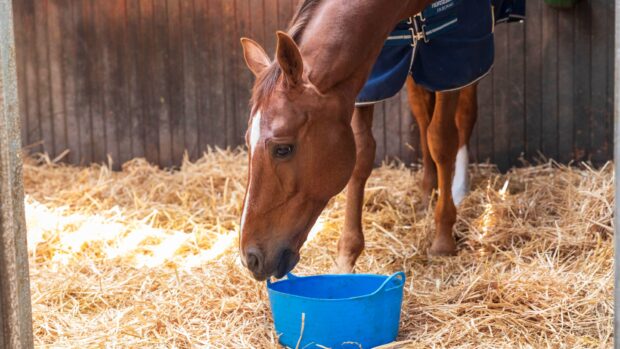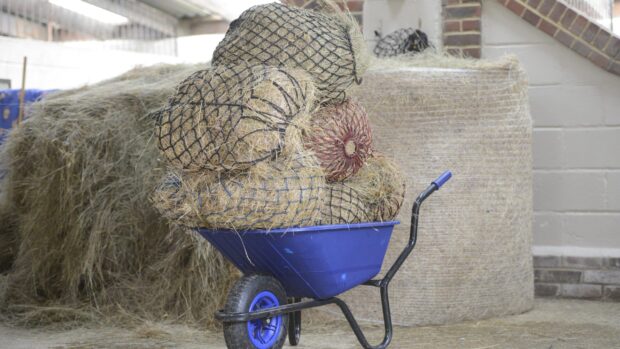The rules of good feeding state “feed according to work done”, so if you are planning to give your horse a break this winter, you will need to adjust his feed accordingly, but those same rules state that “changes in feeding must be made gradually”, so what is the best way to go about this?
The main reason for cutting feed is to reduce the calorific and, more specifically, the starch and sugar component of the diet, to avoid weight gain, excitability or muscle problems, particularly for horses susceptible to the condition widely known as tying-up, azoturia or ERS. But if your horse needs to put weight on during his break, then this requires a different plan of action.
Nicola Tyler, nutrition director at TopSpec shares her top tips for feeding a horse that is about to be turned away or is already on a winter holiday.
“The general principle is that you can reduce the amount of hard feed fed to a horse a lot quicker than you can introduce it, providing there is ample forage available — it won’t upset a horse’s digestive system to cut hard feed out straight away.
“If your horse is having a short holiday (three weeks or less) and is in good condition, you are usually fine to feed a vitamin, mineral and salt-based feed, such as a balancer, or an all-round vitamin and mineral supplement mixed with chaff.
“If your horse needs to gain weight while he is on his holiday, then continue to feed hard feed designed with weight gain in mind, but if your horse needs to lose weight, then this is a great opportunity to achieve that by reducing calories to a minimum.
“A fit competition horse can have a holiday for three weeks and hardly lose any of its fitness — if your horse is only off for this period of time, then feed a balancer to help keep microflora healthy in the gut.
“If your horse is off for a longer period of time, maybe up to six months or a year, feed only forage and an appropriate balancer — for example a light balancer in the summer and one high in protein in the winter as grass has significantly less protein content during the cooler months.
“Always make sure clean, fresh water and a salt lick are available as there is hardly any sodium in grass and a lack of it can lead to health issues, such as tying up.”
Lucy Smith, a professional groom agrees, saying that each individual horse is different and so they must be treated on a case-by-case basis when roughing off for the winter.
“Each horse must be treated as an individual, but as a rough guide we tend to reduce a horse’s workload steadily — it would be unfair to expect a horse to settle if you throw them straight out in the field when they have been in full work,” she explains.
“We do this by putting horses on the walker for less and less time, or perhaps taking them for a gentle hack to help their brains wind down. Same goes for rugging — by making changes gradually it give the horse time to adjust and they are more likely to go out on holiday in the right frame of mind.
“As hard feed is reduced and cut out, we feed ad lib forage in the form of hay or haylage in the field to keep the gut healthy — a horse will never be without hay or haylage while on holiday. We tend to keep a rug on horses throughout their winter holidays — but these will be taken off so the horses’ can be checked regularly during their time off.”
Tracey Hammond from Dengie adds: “Alfa-A Molasses Free combines chopped and pelleted alfalfa with a rapeseed oil coating and the added herbs mint and fenugreek. Based on entirely slow-release energy sources Alfa-A Molasses Free is ideal for condition without the fizz and the added pellets and herbs are great for fussy feeders. For those that need a lower calorie option Hi-Fi Molasses Free combined chopped and pelleted alfalfa and straw with a light oil coating and the added herbs mint and fenugreek. These feeds should be combined with a broad-spectrum vitamin and mineral supplement or balancer to provide a balanced ration.”
You might also be interested in:

Top tips help tackle horse weight loss worries ahead of winter

Expert advice for feeding a horse to avoid gastric ulcers

Subscribe to Horse & Hound magazine today – and enjoy unlimited website access all year round
Horse & Hound magazine, out every Thursday, is packed with all the latest news and reports, as well as interviews, specials, nostalgia, vet and training advice. Find how you can enjoy the magazine delivered to your door every week, plus options to upgrade your subscription to access our online service that brings you breaking news and reports as well as other benefits.



